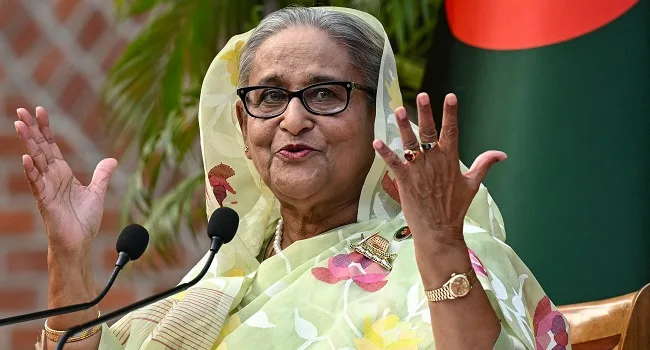A Bangladesh court on Monday sentenced ousted prime minister Sheikh Hasina to death for crimes against humanity, prompting cheers in the packed courtroom as Judge Golam Mortuza Mozumder read the verdict.
Hasina, 78, who has been living in India, defied court orders to return to Dhaka for the trial, which centered on whether she ordered a deadly crackdown against a student-led uprising that contributed to her ouster in August 2024. The verdict, broadcast live on national television, comes ahead of Bangladesh’s first elections since her removal.
“All the elements constituting crimes against humanity have been fulfilled,” Judge Mozumder said. Hasina was found guilty on three counts: incitement, ordering killings, and failing to prevent atrocities. “We have decided to inflict only one sentence — the death penalty,” he added.
Former Interior Minister Asaduzzaman Khan Kamal, also a fugitive, received the death sentence after being convicted on four counts of crimes against humanity. Former police chief Chowdhury Abdullah Al-Mamun, who pleaded guilty, was sentenced to five years in prison.
Bangladesh has been in political turmoil since the end of Hasina’s autocratic rule. Violence has marred campaigning for elections expected in February 2026. The United Nations reports that up to 1,400 people were killed during the crackdowns that were central to her trial.
Chief Prosecutor Tajul Islam said he hoped the verdict would satisfy the people’s “thirst for justice” and mark an end to crimes against humanity. Prosecutors had filed five charges, including failure to prevent murder, which fall under Bangladeshi law as crimes against humanity. The trial included months of testimony in absentia detailing mass killings allegedly ordered by Hasina.
Hasina, who rejected all charges and refused to recognize the court’s authority, was assigned a state-appointed lawyer. In an October interview with AFP, she called the trial a “jurisprudential joke” and said a guilty verdict was “preordained.”
Deepening crisis
Security forces heavily fortified Dhaka ahead of the verdict, with checkpoints and armoured vehicles deployed across the capital. Dhaka Municipal Police spokesman Talebur Rahman said nearly half of the city’s 34,000 officers would be on duty.
The capital has seen crude bomb attacks this month, including petrol bombs targeting government buildings, buses, and Christian sites. Bangladesh’s foreign ministry also summoned India’s envoy, demanding that New Delhi prevent Hasina from speaking to journalists or spreading “hatred” abroad.
Despite the sentence, Hasina remains defiant. She expressed sorrow over lives lost during the student crackdown but has insisted her actions were part of attempts to retain power. She has also criticized the interim government’s ban on her former party, the Awami League, warning it is worsening the country’s political crisis ahead of the elections in Bangladesh, a nation of 170 million people.


